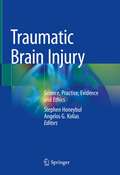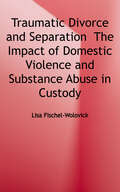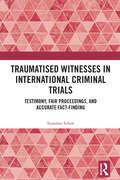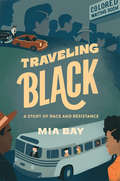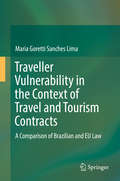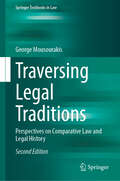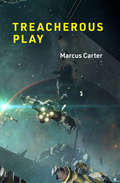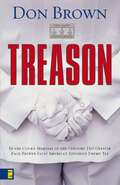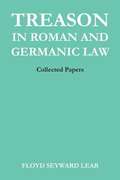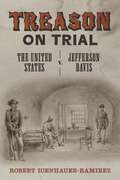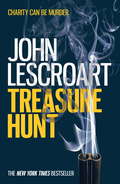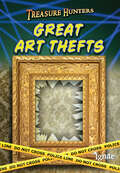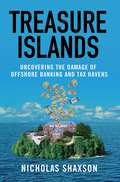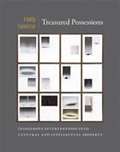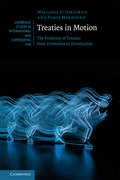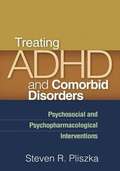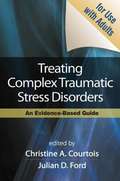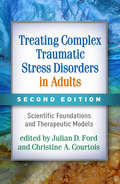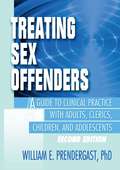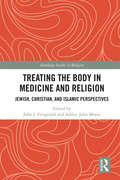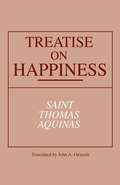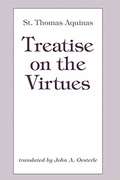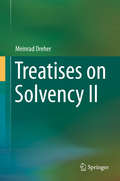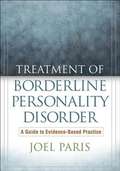- Table View
- List View
Traumatic Brain Injury: Methods for Clinical and Forensic Neuropsychiatric Assessment,Third Edition
by Daryl B. Lund Robert P. Granacher Jr.Traumatic Brain Injury: Methods for Clinical and Forensic Neuropsychiatric Assessment, Third Edition provides physicians and psychologists with a scientifically based schema for the clinical evaluation of traumatic brain injury (TBI). The book assists physicians and psychologists in developing treatment plans for patients who have sustained TBIs an
Traumatic Brain Injury: Science, Practice, Evidence and Ethics
by Stephen Honeybul Angelos G. KoliasThis book provides a comprehensive analysis of the contemporary management of all aspects of traumatic brain injury (TBI), combining the findings of several recent randomised controlled trials investigating the role of hypothermia, erythropoietin, intracranial pressure monitoring and decompressive craniectomy in the management of TBI. The book is divided into four sections: the first section covers the epidemiology of TBI, the changing global patterns of presentation, and the basic pathophysiology and classification, while the second discusses contemporary management of TBI, from pre-hospital care, emergency assessment, and medical and surgical management to rehabilitation and social reintegration. The third section then examines the evidence gained from recent clinical trials that have investigated the efficacy of management strategies involving intracranial pressure monitoring, multimodal monitoring, hypothermia, erythropoietin, thromboembolic prophylaxis and decompressive craniectomy. Lastly, the fourth section explores the ethical issues, both at the societal level and on an individual basis. Written by a broad range of experts, this book provides a valuable reference resource for neurosurgeons, intensivists, clinicians with ethical experience and pure bioethicists in their daily work.
Traumatic Divorce and Separation: The Impact Of Domestic Violence And Substance Abuse In Custody And Divorce
by Lisa Fischel-WolovickTraumatic Divorce and Separation integrates the conflicting mental health perspectives concerning trauma theory and the study of divorce, in what the author has termed "traumatic divorce" -- that is, divorce complicated by the high-risk factors of domestic violence, mental illness, and/or substance abuse. The text's interdisciplinary discussion examines issues of financial disparities for women following divorce, traumatic symptoms in children and adults, and the legal controversies about the admissibility of psychological theories related to abuse. The author also addresses: domestic violence as a gendered crime against women; the need for a trauma-informed judicial response; and the need for a systemic judicial response that incorporates an understanding of domestic violence and child maltreatment to provide services and protections. The book is an invaluable resource for professionals and academics in social work, forensic psychology, law, and related mental health fields, as well as academics interested in gender based discrimination in the courts.
Traumatised Witnesses in International Criminal Trials: Testimony, Fair Proceedings, and Accurate Fact-Finding
by Suzanne SchotThis book focuses on the testimonial evidence of traumatised witnesses in trials of international crimes, which deal with acts of genocide, war crimes and crimes against humanity. Such trials often involve the testimonies of those who experienced or witnessed extremely traumatic events, which can make it hard for these witnesses to recall specific details. Testifying during trial may in itself also pose challenges to their well-being. Yet the legal process of determining whether someone can be held criminally responsible for the alleged crimes needs to be fair, in accordance with the right to a fair trial of the accused, and the facts need to be determined as accurately as possible. This book argues that to ensure fair and accurate fact-finding when in particular traumatised witnesses testify, a balance needs to be struck between the needs of witnesses who testify about traumatic experiences, the fair trial rights of the accused and the objective of the court to establish as accurately as possible the responsibility of the accused. This is crucial throughout the stages of selecting, preparing, presenting and assessing the testimonial evidence of traumatised witnesses. The methodology involves an analysis of transcripts of proceedings and case law of the International Criminal Tribunal for the former Yugoslavia, the International Criminal Court and Dutch courts prosecuting international crimes. The research demonstrates that it is often difficult to strike a balance between the competing objectives during proceedings when traumatised witnesses testify due to the current lack of regulations and guidelines applicable during investigations and prosecutions. This book shows that this balance can, and should, be achieved when traumatised witnesses testify during criminal proceedings for international crimes. The work is an invaluable resource for researchers, academics and practitioners in criminal law, criminology, legal psychology, legal psychiatry, social anthropology and forensic sciences.
Traveling Black: A Story of Race and Resistance
by Mia BayA riveting, character-rich account of racial segregation in America that reveals just how central travel restrictions were to the creation of Jim Crow laws—and why “traveling Black” has been at the heart of the quest for racial justice ever since. Why have white supremacists and civil rights activists been so focused on Black mobility? From Plessy v. Ferguson to #DrivingWhileBlack, African Americans have fought for over a century to move freely around the United States. Curious as to why so many cases contesting the doctrine of “separate but equal” involved trains and buses, Mia Bay went back to the sources with some basic questions: How did travel segregation begin? Why were so many of those who challenged it in court women? How did it move from one form of transport to another, and what was it like to be caught up in this web of contradictory rules? From stagecoaches, steamships, and trains to buses, cars, and planes, Traveling Black explores when, how, and why racial restrictions took shape and brilliantly portrays what it was like to live with them. “There is not in the world a more disgraceful denial of human brotherhood than the ‘Jim Crow’ car of the southern United States,” W. E. B. Du Bois famously declared. Bay unearths troves of supporting evidence, rescuing forgotten stories of undaunted passengers who made it back home despite being insulted, stranded, re-routed, and ignored. Black travelers never stopped challenging these humiliations and insisting on justice in the courts. Traveling Black upends our understanding of Black resistance, documenting a sustained fight that falls outside the traditional boundaries of the Civil Rights Movement. A masterpiece of scholarly and human insight, this book helps explain why the long, unfinished journey to racial equality so often takes place on the road.
Traveller Vulnerability in the Context of Travel and Tourism Contracts: A Comparison Of Brazilian And Eu Law
by Maria Goretti Sanches LimaThe book highlights the link between consumers and travellers, identifying the meaning of vulnerability in Brazil and the EU. It also covers different types of contracts for tourism and travel services, including online booking processes. Only after 2015, as a result of the directive on package travel and linked travel arrangements, did the EU begin viewing travellers as consumers in the sense of Union Consumer Law; conversely, in Brazil, the traveller has no legal status whatsoever and is considered solely a consumer. As the traveller is implicitly a consumer he/she is subject to vulnerability. However, the definition of vulnerability differs considerably between Brazil and the EU: while in Brazil it is a principle stemming from the Consumer Defence Code, covering all consumers, in the EU vulnerability is not an established principle. In the EU, although the average consumer is assumed to be reasonably well informed, observant and circumspect, they are also recognised as the weaker party in the contract. That recognition does not fit with the notion of "confident consumer". Vulnerable consumers in the EU are those whose individual characteristics, such as their age, physical or mental infirmity, or credulity, make them particularly susceptible to unfair commercial practices. Conversely, in Brazil these consumers are seen as being hyper-vulnerable, rather than solely vulnerable. In this context, travellers are in a weaker position than regular consumers buying goods or services, because they are outside of their domicile or jurisdiction for a brief or extended period of time. This book examines two types of traveller vulnerability that make travellers, particularly international ones, a special type of consumers: 1. External and 2. Legal (jurisdiction). Travellers’ vulnerability mainly stems from consumers travelling to different markets and different cultures. As such, they are subject to different laws that require special global attention. While both the EU and Brazilian system have their respective advantages and disadvantages, the goal of both must be to further increase protection for travellers, including business travellers. In consumer societies, the traveller is indeed a consumer by logical causation and hence a “special consumer”.
Traversing Legal Traditions: Perspectives on Comparative Law and Legal History (Springer Textbooks in Law)
by George MousourakisThis textbook provides clear, reliable, and comprehensive insights into key topics in comparative law and legal history. As fundamental pillars of modern legal education, comparative law and legal history play a crucial role in shaping a new generation of legal scholars and practicing lawyers who appreciate the significance of legal diversity while recognizing the shared foundations of legal systems worldwide. By integrating these two disciplines, scholars and professionals can better understand the dominant features and developmental trajectories of various legal systems, fostering a broader, more culturally informed perspective on the law. This approach enables readers to develop the analytical skills and critical standards necessary to address the complexities of an increasingly interconnected and rapidly evolving legal landscape. The book is divided into two main parts. Part I explores the foundational principles of comparative law, tracing its historical evolution and examining its relationship with other areas of legal study. It provides an extensive overview of legal comparatism from classical antiquity to the modern period, with particular attention paid to the contributions of eighteenth- and nineteenth-century thinkers who helped shape the field. Additionally, it assesses the role of comparative law in contemporary legal scholarship, lawmaking, and judicial decision-making, highlighting its methodological approaches and practical applications in both domestic and international contexts. In turn, Part II examines the historical development and defining characteristics of major legal traditions. It begins with the Roman and civil law tradition, followed by an exploration of the English common law tradition, the Islamic legal tradition, and various indigenous legal traditions. Special attention is given to legal transplantation, including a case study on the Japanese legal tradition and its interactions with Chinese and Western legal influences. By integrating comparative law and legal history, this book provides readers with the knowledge and analytical tools needed to navigate diverse legal traditions and systems, promoting a deeper understanding of historical legacies and contemporary legal challenges.
Treacherous Play (Playful Thinking)
by Marcus CarterThe ethics and experience of &“treacherous play&”: an exploration of three games that allow deception and betrayal—EVE Online, DayZ, and Survivor.Deception and betrayal in gameplay are generally considered off-limits, designed out of most multiplayer games. There are a few games, however, in which deception and betrayal are allowed, and even encouraged. In Treacherous Play, Marcus Carter explores the ethics and experience of playing such games, offering detailed explorations of three games in which this kind of &“dark play&” is both lawful and advantageous: EVE Online, DayZ, and the television series Survivor. Examining aspects of games that are often hidden, ignored, or designed away, Carter shows the appeal of playing treacherously. Carter looks at EVE Online&’s notorious scammers and spies, drawing on his own extensive studies of them, and describes how treacherous play makes EVE successful. Making a distinction between treacherous play and griefing or trolling, he examines the experiences of DayZ players to show how negative experiences can be positive in games, and a core part of their appeal. And he explains how in Survivor&’s tribal council votes, a player&’s acts of betrayal can exact a cost. Then, considering these games in terms of their design, he discusses how to design for treacherous play. Carter&’s account challenges the common assumptions that treacherous play is unethical, antisocial, and engaged in by bad people. He doesn&’t claim that more games should feature treachery, but that examining this kind of play sheds new light on what play can be.
Treason (The Navy Justice Series #1)
by Don BrownThe stakes are high . . . and the entire world is waiting for the verdict. The Navy has uncovered a group of radical Islamic clerics who have infiltrated the Navy Chaplain Corps, inciting sailors and marines to acts of terrorism. And Lieutenant Zack Brewer has been chosen to prosecute them for treason and murder. Only three years out of law school, Zack has already made a name for himself, winning the coveted Navy Commendation medal. Just coming off a high-profile win, this case will challenge the very core of Zack's skills and his Christian beliefs-beliefs that could cost him the case and his career. With Diane Colcernian, his staunchest rival, as assistant prosecutor, Zack takes on internationally acclaimed criminal defense lawyer Wells Levinson. And when Zack and Diane finally agree to put aside their animosity, it causes more problems than they realize.
Treason in Roman and Germanic Law: Collected Papers
by Floyd Seyward Lear"Treason" is a word with many connotations, a word applied to a host of varied offenses throughout the history of mankind. These essays by Floyd Seyward Lear analyze the development of the political theory of treason from its beginning in Roman Law to its transformation in the Germanic custom of the early Middle Ages. The author has presented treason as a political idea, possessing historical continuity, though varying from age to age as it follows the evolution of political authority itself. These studies trace the shifting emphasis in crimes against the state from acts directed against a central absolutist authority to acts involving the personal relationship of a pledged troth and individual fealty. This is a shift from the concept of majesty in Roman law to the concept of fidelity in Germanic law with the corollary shift from allegiance as an act of deference to allegiance as a token of mutual fidelity. These ideas are examined chronologically across an interval extending from archaic Roman law to incipiently feudal forms, from which modern theories of treason, allegiance, and sovereignty derive. Contemporary concepts in these political areas can hardly be understood apart from their historical origins. Broadly considered, this work is intended as a contribution to intellectual history. Further, this collection represents the synthesis of material widely scattered in the primary sources and relevant secondary works. The two concluding bibliographical essays are intended as a general survey of the literature relevant to these studies in Roman and Germanic public law. Descriptive and interpretive works which deal with treason and its allied aspects of political and legal theory are not numerous in the English language.
Treason on Trial: The United States v. Jefferson Davis (Conflicting Worlds: New Dimensions of the American Civil War)
by Robert Icenhauer-RamirezIn the immediate aftermath of the Civil War, federal officials captured, imprisoned, and indicted Jefferson Davis for treason. If found guilty, the former Confederate president faced execution for his role in levying war against the United States. Although the federal government pursued the charges for over four years, the case never went to trial. In this comprehensive analysis of the saga, Treason on Trial, Robert Icenhauer-Ramirez suggests that while national politics played a role in the trial’s direction, the actions of lesser-known individuals ultimately resulted in the failure to convict Davis. Early on, two primary factions argued against trying the case. Influential northerners dreaded the prospect of a public trial, fearing it would reopen the wounds of the war and make a martyr of Davis. Conversely, white southerners pointed to the treatment and prosecution of Davis as vindictive on the part of the federal government. Moreover, they maintained, the right to secede from the Union remained within the bounds of the law, effectively linking the treason charge against Davis with the constitutionality of secession. While Icenhauer-Ramirez agrees that politics played a role in the case, he suggests that focusing exclusively on that aspect obscures the importance of the participants. In the United States of America v. Jefferson Davis, preeminent lawyers represented both parties. According to Icenhauer-Ramirez, Lucius H. Chandler, the local prosecuting attorney, lacked the skill and temperament necessary to put the case on a footing that would lead to trial. In addition, Supreme Court Chief Justice Salmon P. Chase had little desire to preside over the divisive case and intentionally stymied the prosecution’s efforts. The deft analysis in Treason on Trial illustrates how complications caused by Chandler and Chase led to a three-year delay and, eventually, to the dismissal of the case in 1868, when President Andrew Johnson granted blanket amnesty to those who participated in the armed rebellion.
Treasure Hunt (Wyatt Hunt, book 2): A riveting crime thriller with unexpected twists
by John LescroartCharity can be murder...Wyatt Hunt - hero of John Lescroart's New York Times bestseller The Hunt Club - returns in an intricate, tightly plotted thriller set against San Francisco's glamorous charity circuit. Perfect for fans of Michael Connelly and Lee Child. 'Breath-taking' - LA Times When Mickey Dade discovers the body of Dominic Como, he sees this as his chance to prove himself. He's been stuck behind a desk at Wyatt Hunt's private investigative service, The Hunt Club, but now seizes the opportunity to work on a real case. Como was one of San Francisco's most high-profile fundraisers and one suspect in the case is Como's business associate, Alicia Thorpe - young, gorgeous, and the sister of one of Mickey's friends. As Mickey and Hunt are pulled into the case, they soon learn that Como was involved in some highly suspect deals. And the lovely Alicia knows more about this - and more about Como - than she's letting on. As the case reaches its nail-biting conclusion, Mickey Dade finds his world crumbling around him as he learns the hard lessons Hunt knows only too well.What readers are saying about Treasure Hunt:'One of his [John Lescroart's] most complex, riveting and entertaining works to date''I was kept guessing until the very end''He [John Lescroart] keeps you interested from page one right to the end of the book'
Treasure Islands: Uncovering the Damage of Offshore Banking and Tax Havens
by Nicholas ShaxsonA troubling look inside the world of tax havens and corporate masterminds. While the United States experiences recession and economic stagnation and European countries face bankruptcy, experts struggle to make sense of the crisis. Nicholas Shaxson, a former correspondent for the Financial Times and The Economist, argues that tax havens are a central cause of all these disasters. In this hard hitting investigation he uncovers how offshore tax evasion, which has cost the U. S. 100 billion dollars in lost revenue each year, is just one item on a long rap sheet outlining the damage that offshoring wreaks on our societies. In a riveting journey from Moscow to London to Switzerland to Delaware, Shaxson dives deep into a vast and secret playground where bankers and multinational corporations operate side by side with nefarious tax evaders, organized criminals and the world's wealthiest citizens. Tax havens are where all these players get to maximize their own rewards and leave the middle class to pick up the bill. With eye opening revelations, Treasure Islands exposes the culprits and its victims, and shows how: *Over half of world trade is routed through tax havens *The rampant practices that precipitated the latest financial crisis can be traced back to Wall Street's offshoring practices *For every dollar of aid we send to developing countries, ten dollars leave again by the backdoor The offshore system sits much closer to home than the pristine tropical islands of the popular imagination. In fact, it all starts on a tiny island called Manhattan. In this fast paced narrative,Treasure Islands at last explains how the system works, how it's contributing to our ever deepening economic divide, and what we might do to reform the system and effect positive change.
Treasured Possessions: Indigenous Interventions into Cultural and Intellectual Property
by Haidy GeismarWhat happens when ritual practitioners from a small Pacific nation make an intellectual property claim to bungee jumping? When a German company successfully sues to defend its trademark of a Māori name? Or when UNESCO deems ephemeral sand drawings to be "intangible cultural heritage"? In Treasured Possessions, Haidy Geismar examines how global forms of cultural and intellectual property are being redefined by everyday people and policymakers in two markedly different Pacific nations. The New Hebrides, a small archipelago in Melanesia managed jointly by Britain and France until 1980, is now the independent nation-state of Vanuatu, with a population that is more than 95 percent indigenous. New Zealand, by contrast, is a settler state and former British colony that engages with its entangled Polynesian and British heritage through an ethos of "biculturalism" that is meant to involve an indigenous population of just 15 percent. Alternative notions of property, resources, and heritage--informed by distinct national histories--are emerging in both countries. These property claims are advanced in national and international settings, but they emanate from specific communities and cultural landscapes, and they are grounded in an awareness of ancestral power and inheritance. They reveal intellectual and cultural property to be not only legal constructs but also powerful ways of asserting indigenous identities and sovereignties.
Treaties in Motion: The Evolution of Treaties from Formation to Termination (Cambridge Studies in International and Comparative Law #149)
by Malgosia Fitzmaurice Panos MerkourisThe law of treaties is in constant motion, understood not only as locomotion, but also as motion through time and as change. Thus, kinesis and stasis, two sides of the same concept of 'motion', are the central themes of Treaties in Motion. The concept of motion adopted in this book is based on the philosophy of Aristotle. He identified six types of motion: creation (genesis), increase (auxesis), diminution (meiosis), alteration (alloiosis), destruction (phthora), and change of place (kata topon metabole), which has been amended by the authors to change in space-time (kata topon kai chronon metavole) to reflect our modern scientific understanding of time as a dimension through which motion and change occurs. Each chapter's analysis proceeds by focusing on a specific area of a treaty's 'life-cycle', where each type of motion shines through and is described through three different frames of reference: treaties, the Vienna Convention of the Law of Treaties, and customary law.
Treating ADHD and Comorbid Disorders
by Steven Pliszka Larry GreenhillChildren and adolescents with attention-deficit/hyperactivity disorder (ADHD) frequently experience co-occurring problems with aggression, mood swings, tics, anxiety, or depression. Organized around detailed case presentations, this highly informative book helps the clinician make sound decisions when assessing and treating the full range of ADHD comorbidities. Experienced child psychiatrist Steven Pliszka offers straightforward guidance on how to avoid common diagnostic errors, develop an individualized medication regimen, minimize health risks and side effects, collaborate successfully with parents, and tailor psychosocial treatments to each family's needs. A reproducible structured interview facilitates sorting out symptoms and distinguishing between different comorbid disorders.
Treating Complex Traumatic Stress Disorders
by Christine Courtois Julian D. FordChronic childhood trauma, such as prolonged abuse or family violence, can severely disrupt a person's development, basic sense of self, and later relationships. Adults with this type of history often come to therapy with complex symptoms that go beyond existing criteria for posttraumatic stress disorder (PTSD). This important book brings together prominent authorities to present the latest thinking on complex traumatic stress disorders and provide practical guidelines for conceptualization and treatment. Evidence-based assessment procedures are detailed, and innovative individual, couple, family, and group therapies are described and illustrated with case vignettes and session transcripts.
Treating Complex Traumatic Stress Disorders in Adults: Scientific Foundations and Therapeutic Models
by Bessel A. van der KolkThis authoritative reference on complex traumatic stress disorders (CTSDs) and their assessment and treatment has now been significantly revised with more than 75% new material reflecting a decade of advances in the field. Leading experts delve into ways to understand, engage, assess, and treat adults with complex trauma histories, whose symptoms often include but may go well beyond those of posttraumatic stress disorder. The volume presents cutting-edge theory and research on CTSDs, considers diagnostic controversies, and identifies core elements of effective, culturally responsive treatment. Established and emerging therapies specifically tailored to this population are described and illustrated with vivid case examples. Other highlights are chapters on transtheoretical treatment, the crucial role of professionalism and training, and recognizing and managing vicarious traumatization. New to This Edition *Incorporates major advances in research and clinical practice. *Chapters on additional evidence-based individual treatments: prolonged exposure therapy, cognitive therapy, cognitive processing therapy, brief eclectic psychotherapy, eye movement desensitization and reprocessing therapy, narrative exposure therapy, interpersonal psychotherapy, emotion-focused therapy, and the TARGET recovery model. *Chapters on additional evidence-based group and conjoint family therapy models: attachment-based couple therapy and integrated treatment of co-occurring CTSDs and substance use disorders. *Chapters on promising treatments: treatment for structural dissociation, experiential/somatotherapy approaches, mindfulness approaches, and complementary healing therapies. See also Drs. Ford and Courtois's authored book, Treatment of Complex Trauma, which presents their own therapeutic approach for adult clients in depth, and their edited volume Treating Complex Traumatic Stress Disorders in Children and Adolescents.
Treating Sex Offenders: A Guide to Clinical Practice with Adults, Clerics, Children, and Adolescents, Second Edition
by Letitia C Pallone William E PrendergastGain important new insights into religious personnel who molest children! Treating Sex Offenders: A Guide to Clinical Practice with Adults, Clerics, Children, and Adolescents, Second Edition updates the groundbreaking original with new material that integrates adolescent and adult sex offenders, emphasizing similarities and differences in personality type, behavior, and treatment. Author William Prendergast draws on four decades' experience in working in the diagnosis and treatment of habitual sex offenders to present a straightforward look at what makes them tick. This vital new edition includes appropriate additions and changes to treatment techniques, progress reports on case study subjects, reader feedback on the original book, and perhaps most important, new information on religious personnel who molest children. Treating Sex Offenders provides training in clear language for those working with sexual offenders and explanations in simple terms for those suffering as a result of their actions. The book parallels workshops and courses conducted by the author, detailing how to identify major characteristics and traits of offenders, different types of offenders, child and adolescent offenders, how to recognize warning signs of deviant behavior, and how to apply specific treatment techniques that really work. Individual aspects of the makeup and treatment of the compulsive adult and adolescent sex offender are addressed through factors, traits, treatment, and candid cases studies. Treating Sex Offenders addresses the most vital issues involving sexual pathology, including: inadequate personality theory sexual performance problems imprinting self-confrontation sex as the chosen deviation the five c's of sex offender treatment and much more! Treating Sex Offenders: A Guide to Clinical Practice with Adults, Clerics, Children, and Adolescents, Second Edition is an essential resource for psychiatrists, psychologists, social workers, counselors, and those in the criminal justice field who deal with sex offenders on a daily basis. Family members involved in the lives of sex offenders and survivors of sexual abuse or assault will find the case studies enlightening in making sense of a tragic situation.
Treating the Body in Medicine and Religion: Jewish, Christian, and Islamic Perspectives (Routledge Studies in Religion)
by John J. Fitzgerald Ashley John MoyseModern medicine has produced many wonderful technological breakthroughs that have extended the limits of the frail human body. However, much of the focus of this medical research has been on the physical, often reducing the human being to a biological machine to be examined, understood, and controlled. This book begins by asking whether the modern medical milieu has overly objectified the body, unwittingly or not, and whether current studies in bioethics are up to the task of restoring a fuller understanding of the human person. In response, various authors here suggest that a more theological/religious approach would be helpful, or perhaps even necessary. Presenting specific perspectives from Judaism, Christianity and Islam, the book is divided into three parts: "Understanding the Body," "Respecting the Body," and "The Body at the End of Life." A panel of expert contributors—including philosophers, physicians, and theologians and scholars of religion— answer key questions such as: What is the relationship between body and soul? What are our obligations toward human bodies? How should medicine respond to suffering and death? The resulting text is an interdisciplinary treatise on how medicine can best function in our societies. Offering a new way to approach the medical humanities, this book will be of keen interest to any scholars with an interest in contemporary religious perspectives on medicine and the body.
Treatise on Happiness (Notre Dame Series in the Great Books)
by St. Thomas AquinasThe Treatise on Happiness and the accompanying Treatise on Human Acts comprise the first twenty-one questions of I-II of the Summa Theologiae. From his careful consideration of what true happiness is, to his comprehensive discussion of how it can be attained, St. Thomas Aquinas offers a challenging and classic statement of the goals of human life, both ultimate and proximate. This translation presents in accurate, consistent, contemporary English the great Christian thinker's enduring contributions on the subject of man's happiness.
Treatise on the Virtues
by Thomas Aquinas John A. OesterleIn his Treatise on the Virtues, Aquinas discusses the character and function of habit; the essence, subject, cause, and meaning of virtue; and the separate intellectual, moral, cardinal, and theological virtues. His work constitutes one of the most thorough and incisive accounts of virtue in the history of Christian philosophy. John Oesterle's accurate and elegant translation makes this enduring work readily accessible to the modern reader.
Treatises on Solvency II
by Meinrad DreherThe European system of insurance supervision under Solvency II constitutes a parallel to supervision of credit institutions under Basel III. At the heart of this new European insurance supervisory regime are the Solvency II Directive, the attendant regulation, and the EIOPA Regulation. The present volume, "Treatises on Solvency II", includes articles on the bases of European insurance supervision and the associated three pillars of solvency, governance, and disclosure, all viewed predominantly from a legal standpoint.
Treatment of Borderline Personality Disorder
by Joel Paris Alexander ChapmanNormal0falsefalsefalseMicrosoftInternetExplorer4Organizing a vast body of scientific literature, this indispensable book presents the state of the art in understanding borderline personality disorder (BPD) and distills key treatment principles that therapists need to know. Rather than advocating a particular approach, Joel Paris examines a range of therapies and identifies the core ingredients of effective intervention. He offers specific guidance for meeting the needs of this challenging population, including ways to improve diagnosis, promote emotion regulation and impulse control, maintain appropriate therapeutic boundaries, and deal with suicidality and other crises. Highly readable, practical, and humane, the book also explains the latest thinking on the causes of BPD and how it develops.

